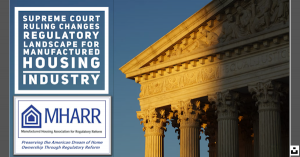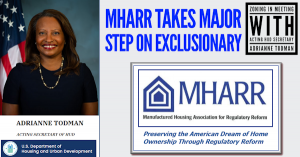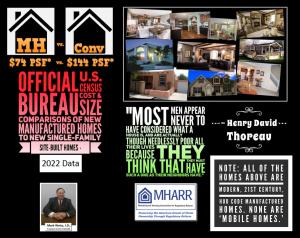Supreme Court Ruling Changes Manufactured Housing Regulatory Landscape Industry per Manufactured Housing Association

Supreme Court (SCOTUS) Ruling Changes Regulatory Landscape for Manufactured Housing Industry Manufactured Housing Association for Regulatory Reform (MHARR).

Acting HUD Secretary Adrianne Todman MHARR Takes Major Step on Exclusionary Zoning in Meeting with Acting HUD Secretary Adrianne Todman Manufactured Housing Association for Regulatory Reform (MHARR)

Manufactured Housing Production Rises In April 2024 per data from the Manufactured Housing Association for Regulatory Reform (MHARR).
Manufactured Housing Association for Regulatory Reform (MHARR) President-CEO Mark Weiss memo claims potential affordable housing benefits from Loper decision.
The decision, in Loper Bright Enterprises v. Raimondo, eliminates a doctrine of federal regulatory law which has been in existence since 1984, known as “Chevron deference.” The Chevron doctrine, first enunciated by the Court in Chevron USA v. Natural Resources Defense Council, held that in litigation involving the interpretation of an allegedly ambiguous federal statute (or portion thereof), the interpretation given that statute by the federal agency charged with its enforcement would be given deference by a reviewing court. Thus, for example, in a hypothetical challenge involving the interpretation of any aspect of the National Manufactured Housing Construction and Safety Standards Act of 1974, as amended by the Manufactured Housing Improvement Act of 2000 (2000 Reform Law), the interpretation of the statute offered by HUD would be given deference by a reviewing court. This created major difficulties for manufactured housing producers in the 1980s and 1990s (continuing until today) and was a significant impetus for MHARR to pursue comprehensive reform of the original manufactured housing regulatory law in 2000.
Essentially then, under the Chevron doctrine, in virtually any case challenging HUD’s interpretation or application of the industry’s federal regulatory law – or the Department of Energy’s (DOE) ongoing interpretation of the Energy Independence and Security Act of 2008 (EISA) and its horrific manufactured housing energy standards mandate – the “thumb would be on the scale” regarding that agency’s favored statutory interpretation in any conceivable court challenge. Because of that deference to agency rulemaking under Chevron, the industry would, in literally any regulatory court challenge since 1984, face a less-than 50-50 chance of success at the outset.
The elimination of the Chevron doctrine, however, in conjunction with the industry’s existing beneficial laws (i.e., the 2000 Reform Law and the duty to serve underserved markets) will now level the playing field in any court challenge to federal regulatory action involving an arguably ambiguous statutory provision. This sea-change in the calculus underlying regulatory challenges will inevitably impact virtually every decision made by federal regulatory agencies faced with the prospect of judicial challenges made more effective and impactful by the demise of the one-sided Chevron doctrine. As MHARR stated in its above-referenced May 2, 2023 memorandum, “if Chevron deference were overruled … the likelihood of judicial relief concerning many regulatory issues affecting the industry would be enhanced, meaning that agencies would have to confront an increased likelihood of credible litigation over regulatory decisions and actions. This, in turn, would enable MHARR to more aggressively protect, defend and advance the views and interests of manufactured housing producers in Washington, D.C.”
Put simply, the elimination of Chevron deference is an extremely positive development for every federally regulated industry, including the comprehensively-regulated HUD Code manufactured housing industry. Accordingly, the full implications of the Supreme Court’s Chevron ruling, specifically with respect to the HUD Code industry, will be more fully explored, examined and analyzed soon in an upcoming instalment of MHARR Issues and Perspectives.
As is reflected by MHARR’s founding motto – “Preserving the American Dream of Home Ownership through Regulatory Reform” – the industry pioneers and visionaries who established the MHARR-predecessor Association for Regulatory Reform were well-aware that unchecked regulation would be highly detrimental to a comprehensively-regulated industry and to the affordability and availability of manufactured homes. The Supreme Court’s Chevron deference ruling, fortunately, will help restore some of the balance between regulators and regulated parties that was lost during the Chevron era. And, with three regulation-driven bottlenecks suppressing the industry’s growth and evolution as recently detailed by MHARR, this fundamental change in the law could help the industry to chart a new course toward increased production and sales to meet the nation’s great and growing need for affordable homeownership. ##
The balance of the MHARR release issued by Mark Weiss, J.D., President and CEO of MHARR is found at the link below.
https://manufacturedhousingassociationregulatoryreform.org/supreme-court-ruling-changes-regulatory-landscape-for-manufactured-housing-industry/
ManufacturedHomeProNews.com (MHProNews.com) reports that as of this time the Manufactured Housing Institute (MHI) has not yet published a statement on the Loper Bright Enterprises v. Raimondo case that upended decades of the principle of Chevron deference.
https://www.manufacturedhomepronews.com/deep-state-hit-by-scotus-as-chevron-deference-upended-by-loper-ruling-will-regulatory-power-be-limited-hopeful-development-for-mhville-entrepreneurs-and-smaller-businesses-plus-mhmarkets/
About MHARR:
https://manufacturedhousingassociationregulatoryreform.org/about-manufactured-housing-association-for-regulatory-reform-mharr-washington-d-c/
Recent MHARR News:
Broad Discovery Denied in Manufactured Housing DOE Energy Standards Case
https://manufacturedhousingassociationregulatoryreform.org/broad-discovery-denied-in-manufactured-housing-doe-energy-standards-case/
MHARR Takes Major Step on Exclusionary Zoning In Meeting with Acting HUD Secretary Adrianne Todman
"In a meeting with HUD Acting Secretary Adrianne Todman on June 18, 2024, Manufactured Housing Association for Regulatory Reform (MHARR) President and CEO, Mark Weiss, called for decisive action by HUD to address and remove discriminatory zoning mandates which exclude affordable, mainstream HUD-regulated manufactured housing from many communities and is one of the principal drivers of housing unaffordability and unavailability in the United States. More precisely, discriminatory and exclusionary zoning are one of three major bottlenecks that have suppressed the long-term growth of the manufactured housing industry as well as the availability of mainstream HUD Code manufactured housing for all too many American consumers (the others being consumer financing discrimination by Fannie Mae and Freddie Mac and looming excessive federal energy regulation).
As published reports continue to reflect, the United States faces a severe and chronic shortage of affordable housing, which has reduced the United States’ rate of homeownership and housing affordability to their lowest levels ever. This extreme shortage, which corresponds with unprecedentedly low production numbers for HUD Code manufactured homes (which have fallen below 100,000 homes annually in 15 of the past 17 years) represents a catastrophe for lower and moderate-income families due, in substantial part, to zoning exclusion. As legal scholars have recently emphasized, “Exclusionary zoning severely reduces the housing supply in many jurisdictions, thereby preventing people from moving to areas where they could find better jobs and educational opportunities. It also increases homelessness by pricing poor residents out of the housing market. Exclusionary zoning causes enormous harm.” (Emphasis added).
MHARR was one of the principal proponents of the “enhanced” federal preemption of the Manufactured Housing Improvement Act of 2000 (2000 Reform Law), which gave HUD express authority to preempt any type of state or local “requirement” that interferes with federal (i.e., HUD) superintendence of the manufactured housing industry. In 2003, key congressional supporters of the 2000 Reform Law, including Rep. Barney Frank, Rep. Maxine Waters, and Rep. Bennie Thompson, in a letter to the then-HUD Secretary, made it clear beyond any debate that under the enhanced federal preemption of the 2000 Reform Law, localities cannot unfairly inhibit or prohibit development or placement of manufactured housing. As a result, MHARR has consistently urged HUD to exercise this statutory authority to prevent the discriminatory exclusion of affordable manufactured housing via zoning edicts and reiterated that position in urging bold action in support of manufactured housing and manufactured housing land-lease communities by the Acting Secretary.
Significantly, though, and as MHARR emphasized to the Acting Secretary, enhanced federal preemption under the 2000 Reform Law is just one of the multiple legal bases that HUD could, should and must assert to stop the discriminatory exclusion of affordable mainstream HUD-regulated manufactured housing -- and the lower and moderate-income Americans who rely upon them – from far too many communities."
The balance of that press release is linked below.
https://manufacturedhousingassociationregulatoryreform.org/mharr-takes-major-step-on-exclusionary-zoning-in-meeting-with-acting-hud-secretary-adrianne-todman/
Manufactured Housing Production Rises in April 2024 per Manufactured Housing Association for Regulatory Reform (MHARR)
https://manufacturedhousingassociationregulatoryreform.org/hud-code-homes-production/
MHARR's Issues and Perspectives:
https://manufacturedhousingassociationregulatoryreform.org/category/mharr-issues-and-perspectives/
MHARR's Monthly Reports on total U.S. Manufactured Home Production:
https://manufacturedhousingassociationregulatoryreform.org/category/manufactured-home-shipments/
Interviews by MHProNews with MHARR's founding president and CEO, Danny Ghorbani:
https://manufacturedhousingassociationregulatoryreform.org/mhpronews-qa-with-danny-ghorbani/duty-to-serve-mh/ ###
Mark Weiss, J.D., President & CEO
Manufactured Housing Association for Regulatory Reform
+1 202-783-4087
email us here
Visit us on social media:
Facebook
X
LinkedIn
Other
Legal Disclaimer:
EIN Presswire provides this news content "as is" without warranty of any kind. We do not accept any responsibility or liability for the accuracy, content, images, videos, licenses, completeness, legality, or reliability of the information contained in this article. If you have any complaints or copyright issues related to this article, kindly contact the author above.


